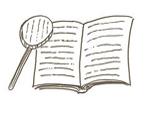Kudos on getting started on your NHD project. You ask a specific question about whether diplomacy and spies are related, and the shortest answer is yes, indeed, there are many events and issues you could explore that connect to both of these subjects. But before I get specific, let me share some approaches to finding those topics.
Choosing a topic for historical research can be a lengthier process that we expect. While you’ve done the key initial step of identifying a personal interest that connects to the theme, below are some tips to help you answer your own question.
Background Reading
Do some background reading on Spies and Diplomacy. You can start with something as simple as an encyclopedia or Wikipedia entry. Look for references to events, issues and people that you find intriguing or puzzling. Take notes on those specifics.
Using primary sources and secondary sources truly allows you to engage in historical research
As you do this background reading, also look for sources that are cited in the footnotes, bibliography, or “further reading” sections that look interesting or that you can find easily. You will want to read multiple accounts and overviews on these topics to get a more full range of the possibilities for specific topics.
The Importance of Questions
Ultimately, your project, given that is a historical research project, will answer a question. A good research question both bounds and guides your investigation. Indeed, questions are key to all your tasks—while doing background reading, record questions you have. Look for information that seems incomplete or unexpected. Ask yourself, what do you want to know more about?
Use your questions to help you look into a topic more deeply and extensively. Ultimately, you will need to revise and craft your question so it is neither too broad nor too narrow. But this will not happen in a day. Learning more about the topic will help you finalize your question.
Available Sources
One thing you will have to figure out is: are there sources available and accessible that address this topic and question? Remember you can’t do a project on a topic that has no available sources!
You will want to use a variety of sources, including texts, photos, and so on. Using primary and secondary sources truly allows you to engage in historical research, as you investigate the voices of the past while learning about how previous historians have made sense of them. And to do this, you will have to go beyond google and explore archives and library holdings. This may sound daunting, but at the end of this answer are some resources that can help.
Next Steps
So practically, after you do some background reading, your next steps could be:
Start with three specific topics (an event or person) or questions to explore and for each, ask the following four questions:
1. Is it interesting?
2. Are there sources on it?
3. Is there a problem or mystery that can be investigated?
4. What have historians already found out about it?
Spend at most a few hours on each topic. In that time, you will hopefully get a sense of whether there is an interesting question and available sources for that topic. (You will find this out by reading more and looking for sources, both on and off line.) Then eliminate two of the three. But be forewarned, you may also discover a different person, event, or question that you find more interesting and manageable for your project. Be prepared for that possibility. Better to change topic in the early stages, than stick unnecessarily with a dull or overly difficult one because you feel you have to.
A Recursive Process
One thing to keep in mind throughout your research is that it is an iterative process. As you read more about spies, you encounter more options for topics. As you search for sources about a specific topic (for example, French Spy in 1775, Julien-Alexandre Achard de Bonvouloir), you will have additional questions. At some point, you will need to finalize your topic and question, but in these early stages, be open to changing and tweaking them. And while your topic will become more fixed as you proceed, you may find that the question you answer continues to be refined for months to come as you learn what the sources reveal.
Remember, researching the past is a complex process, these tips only scratch the surface
Finally, remember that espionage is a secret enterprise. If you pick a less current topic, you may find that more sources are available.
Good Luck!

